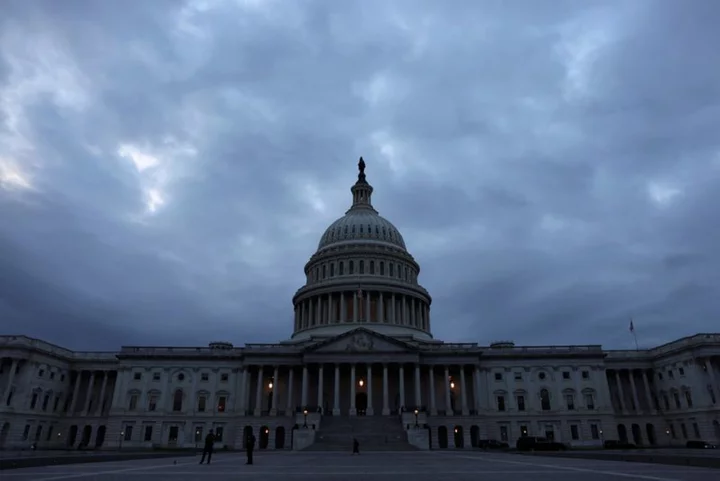A look at the day ahead in U.S. and global markets by Amanda Cooper.
Time is running out to break the impasse on the U.S. government borrowing limit. President Joe Biden is meeting Congressional leaders on Tuesday to try to hash out a compromise to raise the debt limit and avoid a catastrophic default.
Short-term government borrowing rates are cranking towards the 6% mark for the first time in history - not far off the rate you'd expect to pay on a 30-year mortgage, with all the risk that this would entail.
As the Federal Reserve has raised interest rates over the last year, mortgage rates have risen well above 6.5%, meaning that the gap between the yield on a four-week T-bill - seemingly the safest bet on the planet - and the rate of a 30-year mortgage is at its narrowest on record, at just 75 basis points. A 30-year Treasury bond "only" yields 3.8%.
Biden says he's confident there will be a resolution and, while there is a strong element of "well, he would say that, wouldn't he?" the markets are reflecting that investors are hoping for the best, but preparing for the worst.
The cost of insuring against a U.S. sovereign default has shot up to its highest since 2009, at around $7.20 for every $100 worth of Treasuries, according to S&P Global Market Intelligence.
But that's a far cry from the $597 it costs today to insure $100 worth of Turkey's sovereign debt, after a closely contested presidential election at the weekend heads to a run-off vote.
In the biggest political challenge his 20-year rule, President Tayyip Erdogan is leading over opposition rival Kemal Kilicdaroglu, but has fallen short of an outright majority in Sunday's election.
Markets aren't happy. The lira has hit a two-month low against the dollar, and trading in Turkish blue-chip stocks was briefly halted to stop the market from going haywire.
The mood is jittery, to say the least.
So far, those nerves aren't extending to the tech sector, which is holding on a fairly even keel. A regulatory filing on Friday from the family office of George Soros showed the 92-year old billionaire investor has sold his entire stake in Tesla. Soros bought shares in the electric vehicle maker, run by Elon Musk, in 2022, as well as convertible bonds in 2018.
Musk completed his purchase of Twitter for $44 billion after six months of wrangling with the company's shareholders - in which time Tesla lost almost 40% in value. Soros bought the stake in the second quarter of last year, when Tesla shares averaged $274, and sold them in the first months of this year, when they averaged just $173.
Soros wasn't alone in pulling out of some of the pandemic-era darlings in the first three months of the year. Bank of America's weekly "Flow Show" report shows tech stocks came under the heaviest fire in several years in the first quarter, when turmoil engulfed the banking sector, with the collapse of tech-lender Silicon Valley Bank at the heart of it.
That's changed over the second quarter so far. In the week to May 10, BofA said tech funds saw their biggest inflow since December 2021. Don't worry too much about Soros missing out on the Big Tech Bounce. Friday's regulatory filing showed he loaded up on other big tech stocks, including Netflix, Uber, chipmaker Qualcomm and cloud-based data company Snowflake - which fellow 92-year old investor Warren Buffett bought into back in 2020.
Key developments that should provide more direction to U.S. markets later on Monday:
* New York Fed Manufacturing index (April)
* Federal Reserve Bank of Atlanta President Raphael Bostic appears in a live interview on CNBC
* Federal Reserve Bank of Atlanta 2023 Financial Markets Conference - Bostic, Minneapolis Fed President Neel Kashkari, Richmond Fed President Thomas Barkin give remarks.
(Reporting by Amanda Cooper; Editing by Bernadette Baum)

